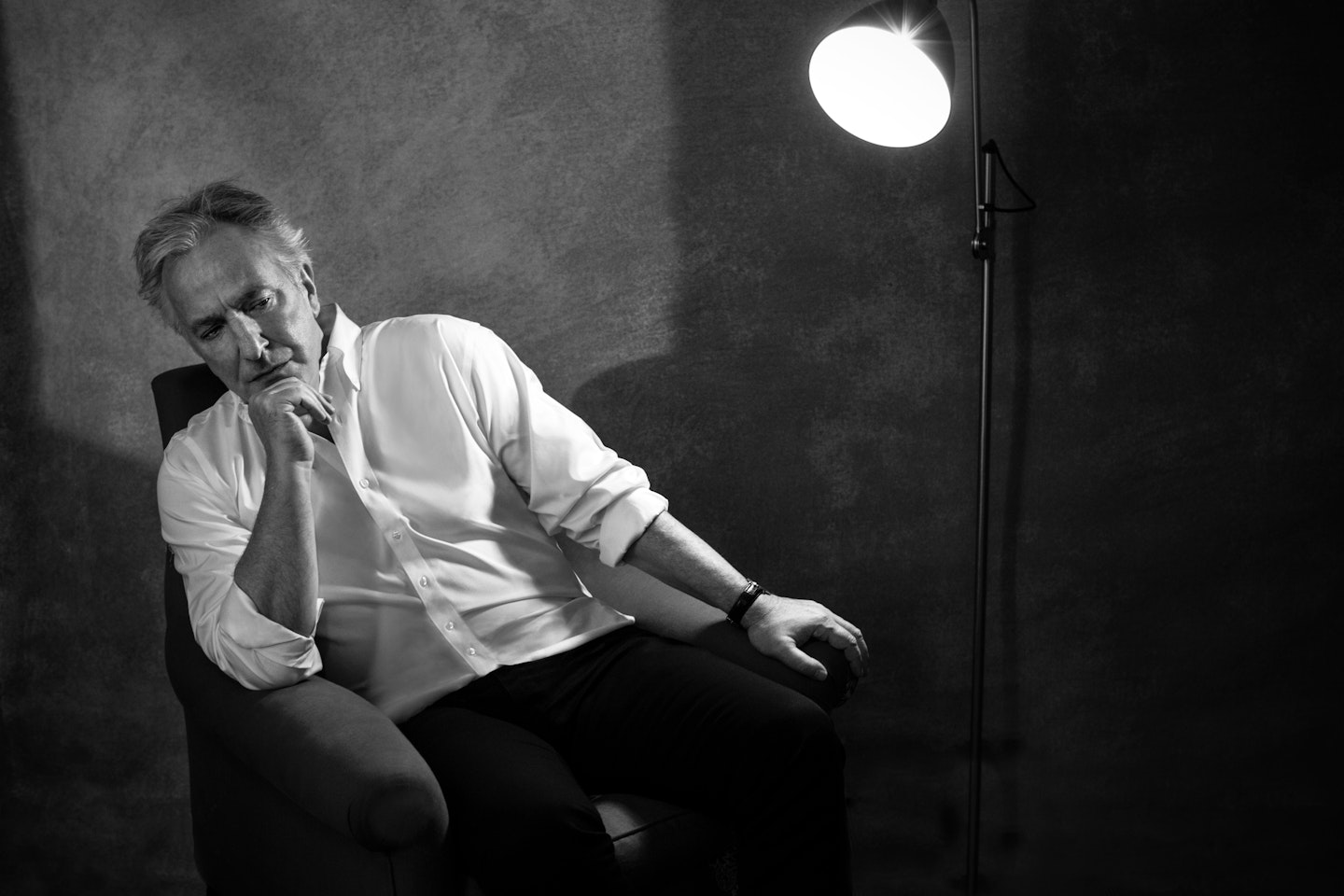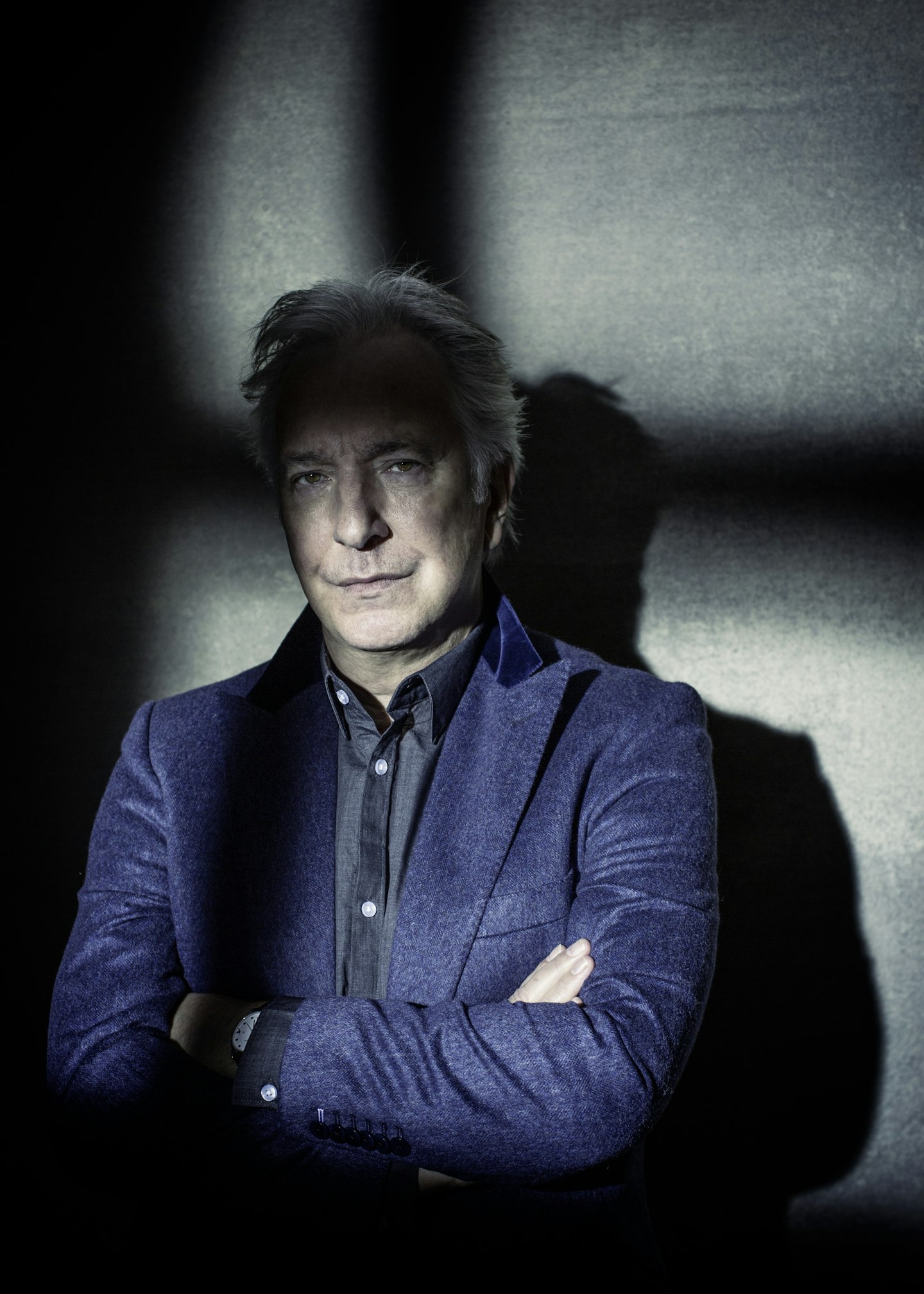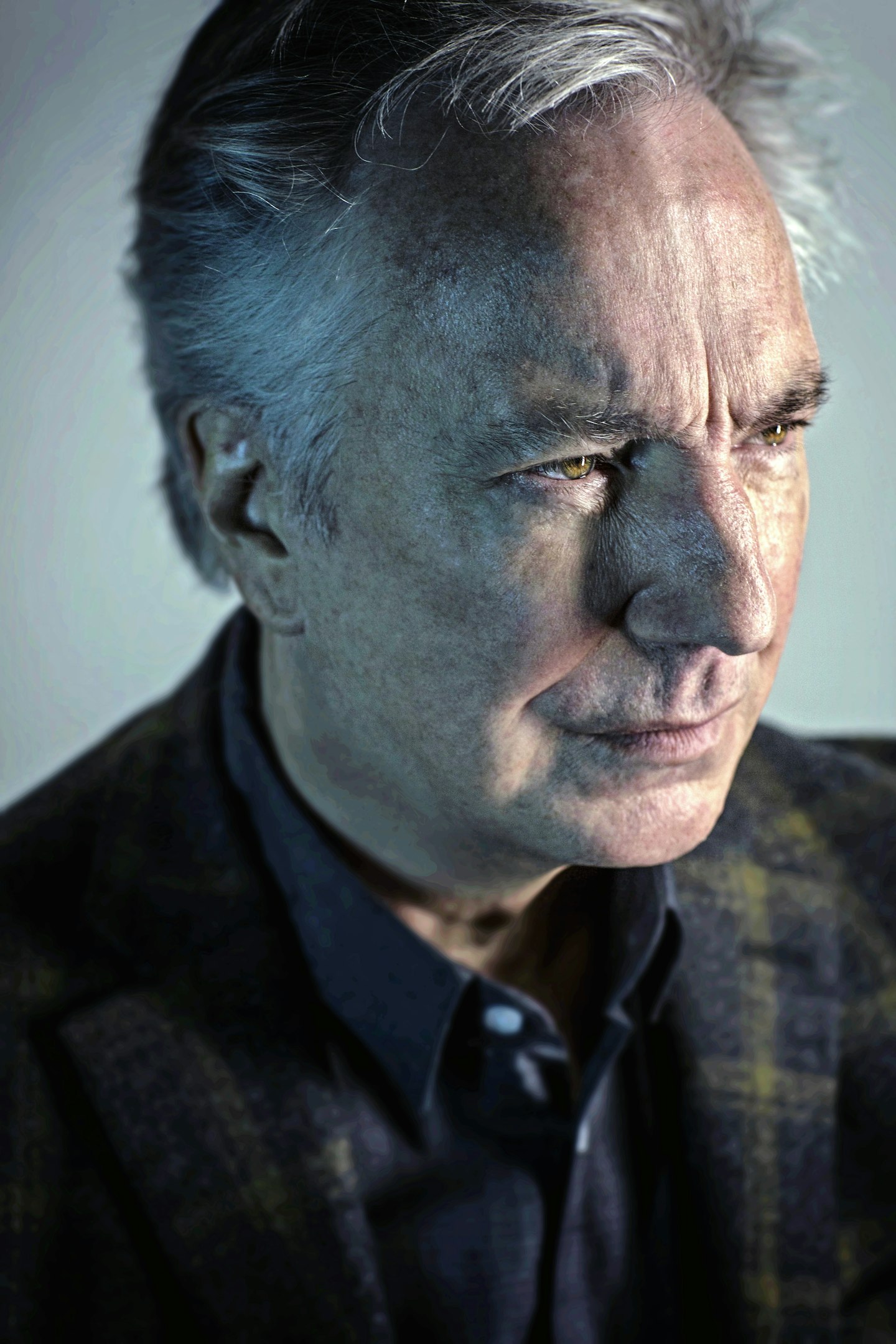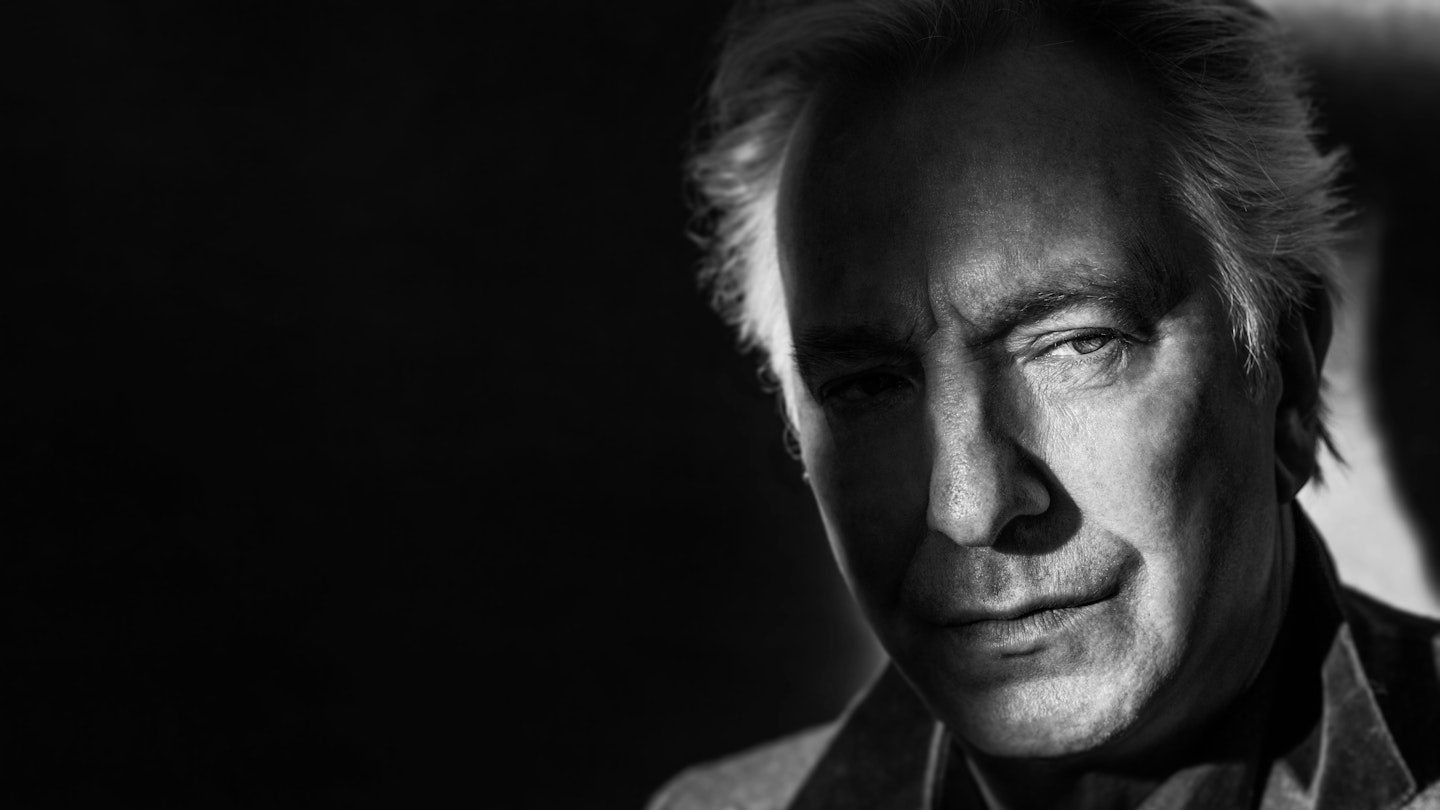This interview first ran in the April 2015 issue of Empire; we are reposting it here in tribute to Alan Rickman, who has sadly died, aged 69.
He'd cut your heart out with a spoon, shoot you in cold blood and cast a spell as withering as his glare... At least, that was the shorthand depiction of Alan Rickman, who tragically died this week at the age of 69. But there was a lot more to the star of Die Hard, Robin Hood: Prince Of Thieves and the Harry Potter juggernaut than these pop cultural highlights. Even in his lesser-seen works, like his beloved 2006 autism drama Snow Cake and Stephen Poliakoff's Close My Eyes, his presence was practically a guarantee of heft and quality.
Rickman made his indelible screen debut in the late '80s after electrifying audiences in Les Liaisons Dangereuses on Broadway and continually cultivated his first love, theatre, even as he became a consistent screen presence, able to be sinister but also slyly funny. With his six-foot stature, piercing eyes and, as every interview is obliged to mention, that voice (sonorous and seductive, like a post-coital Shere Khan), he could appear imposing, intimidating even. But in person he was a warm, engaging man. He saw himself in all his characters, but if you picked one to match his real self it would be the compassionate suitor Colonel Brandon in Sense And Sensibility rather than Die Hard’s mastermind criminal Hans Gruber.
His final performances will be in Gavin Hood's Eye In The Sky and as the Blue Caterpillar in Alice Through The Looking Glass, both out later this year. He last appeared on our screens in April last year as King Louis XIV in A Little Chaos, though he took the part reluctantly, to help ensure the production of his second film as director, after 1997’s The Winter Guest. Starring Kate Winslet as Sabine De Barra, it was a thoughtful and honest film, not unlike the man himself. The following interview with Rickman was conducted shortly before the film's release and ran in the April 2015 issue of Empire.

Going back to the beginning of your screen career, was it important that your success with Die Hard came when you were 42 and not, say, 22?
Well, it felt like being a kid. I was in Hollywood, with all that means. It was exciting and as time has borne out, that script
wasn’t stupid. Stupider films have been made trying to be it since. It’s genuinely witty and every black character is strong in it.
Had it long been your ambition to break into movies?
I never expected to have any kind of film career, to be honest. It was all a bit of a surprise. But I was in a big hit play on Broadway. America, as many people will say, says yes more often than we do. And so I was suddenly surrounded by people saying yes. But I was aware that was ’cause of what I was in. It had a big impact. Then this big adventure started. I was coming from a very cerebral, dark, difficult, layered play by Christopher Hampton and doing an action movie in Hollywood (Die Hard) with explosions, and I was holding a gun.
How did it feel to have that most iconic of action movies as your big-screen debut?
At the time, I kind of thought, "What the fuck am I doing?" That gave me an innocence that was good. And it was exciting just to be in that world. But at the same time, it was a bit of,"I honestly don’t know where this fits into any sort of shape. But, oh well, just better go with it." All I knew was that I could only take my theatre experience to the job, and John McTiernan (the director) said fairly early on, "I’ve learned with you I’ve gotta be ready for the first take." I didn’t know what take two, three, four and five and six were all about. We’ve just done it! But of course, he hadn’t got his lights right or he hadn’t got his camera moves right, or whatever. I knew nothing about any of that. Plus,
I thought I had ripped a ligament on the very first shot. Turned out I’d torn a cartilage, but I knew enough to go downstairs and see the doctor. I said, "I think I heard something crack
in my knee." I was jumping down from a small ledge. He said, "You may have torn a ligament. If you have, you’re out of action for six months." I hadn’t even shot a scene! I was still in my costume, and I said, "Could you pull the trouser leg down over that splint thing?" I went back up to the 33rd floor and carried on shooting. But the doctor said, "Don’t put any weight on that leg!"
Which scene were you shooting?
[The one] where Bruce Willis and I meet and I’m producing an American accent. Then I produce a gun. I’m playing that scene standing on one leg! (Laughs)
Nobody knows, but that’s what I’m doing! The next morning, they drew off this fluid and it was the appropriate colour to say that it was a cartilage and therefore, you know, you’ll recover. There’s a shape you’re gonna have to your career and then there’s what really happens. I thought I was out of a job.

After Die Hard and Robin Hood: Prince of Thieves, was a lot of your power in saying no to similar stuff?
Those two just happened to have a huge impact, one way or another. But somewhere in there I made — and have continued to do — films that disappear without a trace. You still care about them. So there’s the public agenda and there’s the private one. And the private one is certainly more important in a way because that’s what my life is made up of. So while I was doing that, I’d also done Closet Land, which I should think almost nobody saw. And then I worked with Pat O’Conner on The January Man . Truly, Madly, Deeply was in there somewhere. And Close My Eyes. So, you know, from my point of view, it was all quite mixed.
Is it fair to say that you didn’t take easy cheques?
Well, yeah... There’s, like, marks next to an actor’s name or something, and boy does that go up and down! Somewhere
in there, which always causes my mate Miss Ruby Wax great hilarity, I was offered a biopic of Frank Sinatra. Even I knew that was a bad idea! They’ll throw anything at you at certain times. So, you know, to thine own self be true.
What was it like returning repeatedly to a character on screen, with Harry Potter’s Professor Snape?
It was like being in an army camp, because the pressure on the producers was so intense. They had a clipboard for the stuff they had to hit every day. And sometimes there were 300 children on set. So you have to understand what you’re in the middle
of. And it’s a military campaign to get the adult actors there, ’cause half of us were doing something else at the time. I don’t know how they got us all there. But over the course of, what, ten, 12 years? Not only were there different directors, but also inevitably the kids got older. You were watching them grow up. Also, the CGI was getting more and more sophisticated, so whereas at the beginning we’d be off on a location, by the end we were in a pile of shitty old grass out the back of Leavesden with a football stadium of lights. There was a whole crew standing around not quite knowing what to do when Ralph [Fiennes] and I filmed our last scene, because basically it was
down to a couple of actors acting. We never knew what was gonna be put in around us, ’cause they could do it so beautifully by the end. So that kept you interested.
Did it help that Snape is one of the series’ strongest characters?
I suppose my character’s story was so complicated, in among others that weren’t in that way. So there was that to guard, helped by the fact that whenever you showed up you’d button yourself into the hundreds of buttons and put the black contact lenses in and then on would go the wig. Something happens to you when you have a very strong costume. You go inward. Those characters in Harry Potter are not lived through three dimensions. They are who they are. They each have a very strong outline. So it helps if the costume is in many ways that outline.
Is A Little Chaos the second film you’ve wanted to make, or the second you’ve been able to make?
Mostly able, because when I started Harry Potter — not that that took over the whole of my life — Jo Rowling had only written three books and so I didn’t know how long I was going with it. If you’re gonna direct a movie, you’ve gotta know that you’ve got over a year free.
Do you feel people underestimate how consuming directing is, especially trying to look calm when there’s a lot of pressure?
I’ve learned, having been on a lot of sets, the good news is that by definition you are surrounded by experts. They get fired if they’re not — unlike in the theatre! The first film that Anthony Minghella shot was Truly, Madly, Deeply and I remember he gathered the crew and the cast together, on the very first day, and he said, "I have one word: help!" I’ll always say, "What do you think?" Then you choose. You have to ask for opinions.
I said to my First A.D. (assistant director) on A Little Chaos, "If you ever see me about to screw up or do something stupid, for God’s sake tell me!" So that made it a bit easier.
“I never expected to have any kind of film career, to be honest. It was all a bit of a surprise.”
What appealed to you about making A Little Chaos?
There was always a sort of freshness to the dialogue that made me kind of jump with its newness. And then as time went on, I became more and more aware that this was written by a woman (Alison Deegan). Because, although there are three names on the screenplay, Jeremy [Brock] and I really were putting plaster between the bricks or rearranging the bricks. The film is about what it is to be a woman who cannot have a professional life in
a world that’s totally male-dominated. And then it had to be very much fed and watered by Kate, who did a phenomenal amount of research. And then I was able to say, "What do you think?" But, interestingly enough, she said once, "I’m not used to being asked my opinion." I thought, "Well, there’s a parallel."
That’s fascinating, and quite sad.
Very. Because she’s so smart. It’s a loss to any director that just sort of moves her around like a Kate Winslet Object.
Had you and Kate stayed in touch since Sense And Sensibility?
On and off, but both of our lives are like that... Kate went to live in New York for a long time. There’s sort of pogo-stick meetings.
In terms of films that are important to you, but not as well known, what stands out?
Snow Cake is a lovely film. Really proud of that. We shot it in 21 days. I thought Sigourney was amazing in it. And very, very accurate. I think there was some element that thought she had pushed it too far. But not at all when you do the amount of
homework she had done and spent the amount of time she did with adult autistics. She was right on the money. And I think Marc Evans is a terrific director. He’s a sweet, open, honest man and a really good director of actors.
Are there particular qualities that the best directors share?
I suppose openness. I mean, if you have Mike Newell and Alfonso [Cuarón] here together, boy, would they be two different people. And Ang Lee. Certainly as actors, and maybe as directors, you’ve got to hang on to something childlike. You’ve got to know what play is. I haven’t worked with Mike Leigh, but I know him very well and there’s something open in his eyes about what’s in front of him. And the same is true of Alfonso in a Mexican, mad way. There’s an enthusiastic response to something. Neil Jordan, the same, when he gets excited . You just want to know there’s a human being in there.
What kind of acting notes do you prefer: very practical or more theoretical and thematic?
It’s hard to say. It could be physical, or even practical. Somebody could say, which they had to back in the Die Hard days, "Alan, it’s a close-up, keep your head still!" Ang Lee — it’s in print in Emma’s book — he gave us unforgettable notes because of his English: "But Alan, be more subtle. Do more." Which one was
able then to reinterpret as, "I like that, do more of the subtle stuff." It really depends on the individual circumstances. It could be something that makes you go deeper, or something that pulls you out of the deep.

How do you find acting under your own direction?
Awful. And I really wouldn’t have done it, but it was economics. They didn’t have to pay that actor. The only thing that made it bearable was having such a close relationship with Ellen Kuras and travelling in to the set together. So that we would talk, handing her paper with lists of priorities if I was in the scene.
Do you watch yourself on screen?
Never. It’s done. That’s how I feel about that. I’m not saying it’s wrong for everybody, I probably should be stronger and learn to do it, but I think you start to edit yourself.
Is there a part you’ve played which feels closest to your true self?
All of them. It’s me doing them. So what have I got to draw on, really? I mean, there’s the writing and there’s the homework, but then it’s got to be fed through me. That goes back to trying to figure out who you are anyway. In that you choose this job called an actor. This is what I have to use (he indicates his body). Other people can pick up the violin or something. I’ve got this and it’s fallible. Looking back now... It’s 25 years since Die Hard, so it’s a lot of looking back over and figuring out, "Who’s this person that keeps getting dressed up and made to be other people?" But you’re always drawing on yourself somehow, whether you stick a wig on or an accent. It’s my taste and my imagination, I suppose.
Is there any particular director you would single out as your biggest inspiration?
It’s a hard question to answer specifically because, I mean, it would be "round up the usual suspects" in many ways. I was just on the jury of the Marrakesh Film Festival. And we watched 15 films in ten days. And there were a smart bunch of operators on the rest of the jury, from all over the place. The film that we almost unanimously gave the prize to was Corrections Class, which is a first film by a 25 year-old Russian director. It’s alright to have your heroes, but you better be awake to what’s going on right now with a new filmmaker. And more and more that’s the case with kids being able to practise on YouTube and in school. They’ve got the equipment to make a movie with something held in your hand. I think one’s always impressed by not noticing the work of the director. That is what’s impressive about Birdman, the fact that although it is very dazzling from a directorial [point of view], I still got completely caught up in the story. In a way, when the lights come down, I just wanna be a child again.
That’s a great feeling - that buzz...
What worries me... Not worries me, but... about critics watching a film, is when we showed A Little Chaos in Toronto, the response was enormous and visceral and people had really handed themselves over. You could feel the level of silence from 2,000 people was kind of frightening. I just wonder whether critics and journalists ever experience that anymore, because you’re watching it at home or in a screening room, and it’s with like [minded] people.
Well, if you’re not excited by it, should you be doing it?
I always thought about theatre — I’m not sure about film, but certainly in the theatre — if I could press two buttons, first I’d have my lines going across the back of the auditorium, with electric lights — that would calm me down. The other one is all actors should have a T-shirt, whatever the costume, that just says on it, "Believe it or not, I’m doing my best."
